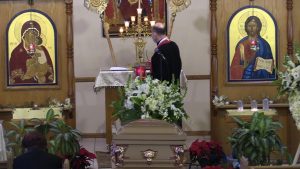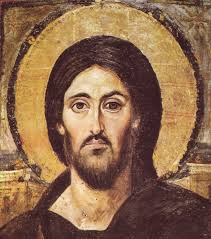Funerals, Blessings and Prayers
The Funeral
 Christ is risen from the dead, and by his death he has trampled upon death, and has given life to those who were in the tombs.
Christ is risen from the dead, and by his death he has trampled upon death, and has given life to those who were in the tombs.
There are three (3) parts to the Funeral Service: at the funeral home, in the church, at the cemetery. All three parts are inter-related and an important part of our belief in the Lord’s Resurrection and our mourning of the deceased.
We follow the pastoral directives outlines in the Pastoral Letter on Christian Death and Funerals.
The Byzantine Church has a special Funeral Service, which is said preferably in a church, over a body to be buried. Cremation is not a Melkite practice and there is no particular service for the cremains the Bishop does make an accommodation in his above cited Pastoral Letter. We advise the families of the departed to speak with the pastor of the parish prior to making funeral arrangements with the Funeral Director (who does not speak for the Church).
The Simple Casket
In point number 13 in Bishop Nicholas’ Pastoral Letter on Christian Death and Funerals (noted above), he advises the family to consider a simple casket for their loved one. The notion of “simple” can be a relative point and even one that is misguided by a sense of wanting to give the best to the one who has died. Money can be better spent on other things if you consider the reality and finality of death. Two options for a simple casket are:
A.) Abbey Caskets is a ministry of the monks at the Archabbey of St. Meinrad.
B.) Trappist Caskets is a ministry of the monks of New Melleray Abbey.
Each of the monasteries make and sell caskets that are very fitting for Melkites. They are beautiful products and worth the time to investigate. Both Abbeys ship their caskets to Connecticut; and their is growing interest in the monastery-made caskets in our State. Both St Meinrad and New Melleray Abbeys have websites giving good, accurate, and sensitive information on their products including a video or two to help you.
When do we commemorate the departed?
There are special memorial services at the forty-days, 6-month and one-year anniversary, as well as several All Souls Saturdays during the Great Fast and Pascha seasons. Special memorial services can be arranged with the priest and are typically said after the Divine Liturgy on Sundays. Also, if you give the priest your list of names, they will be remembered at every Divine Liturgy during the Proskomedia when the priest prepares the bread and wine for the Eucharist.
Melkites traditionally have the forty-day service (the Jennaz) at the end of the Divine Liturgy with a koliva –in Arabic “ameh”– (a cake of boiled wheat and seeds) that is blessed and offered for the soul(s) of the departed; a picture of the person who is being prayed for is added to the table. The symbolism of the wheat and berries runs deep. Melkite Father Philaret notes,
This dish is made of whole wheat berries, boiled, sweetened with honey, flavored with rose ware and spices, and decorated richly. The wheat serves as a reminder of the Good News of Christ our God regarding death – that “unless the grain die and fall to the ground, it will not bring forth new life.” The rose water reminds us that Christ taught that the flowers of the field are arrayed more beautifully than the mightiest king – yet we, His little ones, are more precious than they. The sweetness reminds us of the delights of heaven awaiting all those who follow the narrow way and live the life of a faithful Christian in this world.
Father Philaret notes, “We recall that after Christ our Savior rose from the dead, destroying death and conquering Hades, He appeared on many occasions to His disciples, especially to “the eleven,” i.e. the holy Apostles. And on the fortieth day He called them to the holy mountain, commissioned them to Baptize all nations, and to forgive sins through the Sacrament of Confession. Then, before their very eyes, He was taken up bodily into heaven where He is “enthroned at the right had of the Father.”
 Blessings
Blessings
~The Blessing of a pregnant woman is a noble tradition beautiful moment in the pregnancy. Mothers need God’s help in every step of bringing New Life to our world. Melkite Synod of Bishops, at present, does not have an official prayer for The Blessing of a pregnant woman. This one from the US Conference of Catholic Bishops may suffice or the following:
God of Infinite Goodness, watch over expectant mothers as they await the birth of their child.
Grant these women confidence and strength to dispel their anxiety and fear. Bless them with the courage and faith of Mary, always listening to your will and trusting in your loving care. As they prepare to bring new life into the world, grace them with good health and great joy. We look to you and your Son, Jesus Christ, as a sign of mercy and joy. We ask this through the intercession of Our Lady of Lourdes in the name of your Son, Jesus and the Holy Spirit, now and forever. AMEN.
The Churching of baby is traditionally is celebrated on the Sunday closest the Fortieth Day after the birth of the baby to commemorate Jesus’ being Presented at the Temple on the Fortieth Day after his birth. The beauty of the Churching service is a great spiritual preparation for the baby and the parents as they move to receiving the Mystery of Baptism, Chrismation and Eucharist.
~Blessing of Candles are blessed on the Great Feast of the Holy Hypapanty [Encounter] of Our Lord, God and Savior, Jesus Christ and the Purification of The Theotokos (celebrated on February 2). The reason we have our candles blessed is because blessed candles are a sign of “spiritual Light for all their bearers.”
In the Troparion we sing:
Greetings, Gracious, Godbearing and Virgin, for out of you went to the sun of righteousness, Christ our God, to light up darkness. Rejoice also you righteous old man, you carry in your arms the liberator of our souls, who gives us resurrection.
~Blessing of Water is the eminent symbol of the great feast of Holy Theophany (celebrated on January 6), when we hear the passage of the Gospel of Matthew 3: 13-17 proclaimed and preached. We sing: “All of you who have been baptised into Christ have put on Christ. Alleluia! or As many as have been baptised into Christ have put on Christ. Alleluia!” Theophany Water, for example, is available for a few weeks in church, thereafter please ask the pastor. He can always make Holy Water.
~Pascha bread and eggs
At the end of the Divine Liturgy of Pascha, the priest blesses the Holy Artos (Pascha bread and eggs).
The meaning of dyeing Easter eggs red is to illustrate the trampling of death by the miraculous re-creation of the whole world by the victorious resurrection of Our Lord God and Savior, Jesus Christ. Red symbolizes blood and we believe that Jesus shed his blood on the cross thus giving us New Life the resurrection from the dead– therefore the red egg symbolizes NEW life.
~Cars, motorcycles and various means of transportation
Catholics do interesting things, Melkite Catholics do fun AND interesting things like blessing cars, motorcycles and various means of transportation, We ask God through the intercession of the Holy Prophet Saint Elias (Elijah) on or near the liturgical memorial on July 20. Saint Elias is the patron saint of transportation because Scripture reveals that he a rode chariot of fire into heaven (2 Kings 2:11–12).
~Homes, businesses, and gardens
The faithful are encouraged to have their homes (new and old), businesses and gardens blessed by the priest annually. This occasion is an opportunity to ask God’s blessings upon the the places we live and work and find enjoyment. Often the annual blessing of homes happens during the season of Theophany and before Great Lent. But, Father Dennis is always willing to bless homes and will make it possible to be done at a mutually convenient time.
What is a home blessing?
According to the Byzantine tradition, it is customary to invite the priest once a year for a home blessing, usually associated with the Feast of Theophany (Baptism of the Lord on 6 January). One may request, however, a home blessing anytime during the year. There is a special service for the new home, similar to the consecration of a church. After you move into a new space we recommend having it consecrated and blessed by the priest.
How do I need to prepare?
The priest will need a small table, usually in front of the icon corner facing East. On it you should place a bowl of water, a candle, a list of names (both living and departed), as well as a small glass with olive oil (and a pair of cotton buds) if it is the blessing of a new home. In accordance with our Safeguarding Policy, we recommend that there are always two adults present, besides the priest, during house visits.
Are there any other types of visits?
The priest may be called for pastoral visits throughout the year. These may include special blessings (such as the blessing of a vehicle or of a business), pastoral counselling, catechesis, anointing the sick, praying for the newly born and his/her mother, etc.
***Father Dennis is available all year long to bless all these things according to the rites of the Church. Please call the Parish office to schedule a preferred time for a visit.